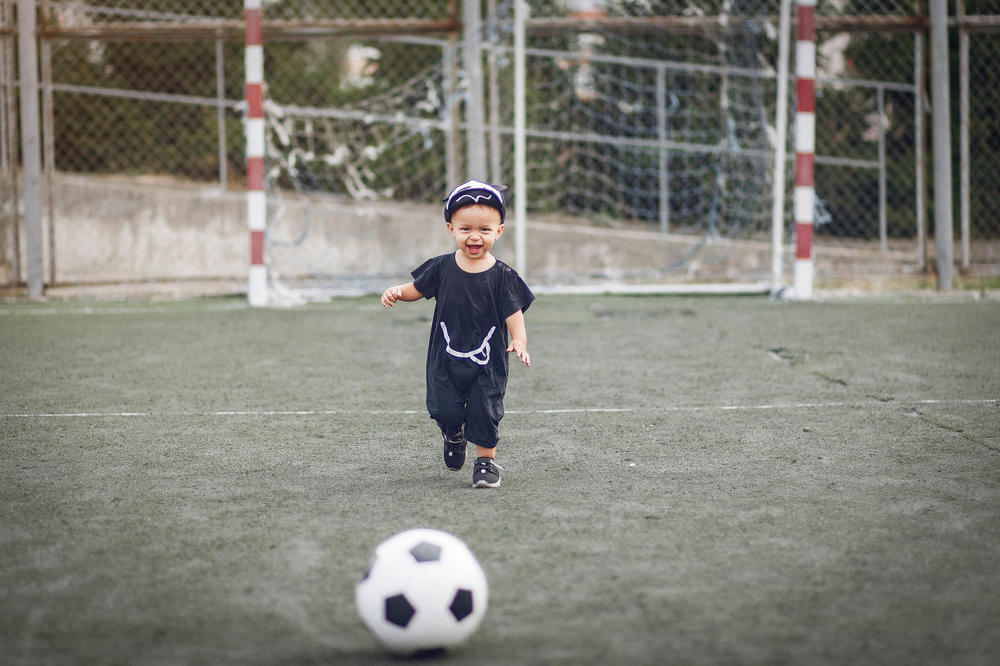Helpful Right from the Beginning
Psychologist Moritz Köster conducts research on why toddlers offer their help to others
Oct 26, 2021
Ready to help – or ready to play? Researchers are still undecided on which motives lie behind toddlers’ helping behavior, for example, when they decide to hand back a ball to an adult.
Image Credit: pexels-gustavo-fring
Whoopsie daisy! A ball falls out of a man’s hand and rolls off the table. He seems unable to reach the ball, even when he really stretches out to grab it. A toddler observing this scene would almost certainly crawl over and hand the ball to the man. Development psychologists call this “prosocial behavior” and it has been observed in children as young as toddlers in their second year of life. Moritz Köster, a professor in the Department of Education and Psychology at Freie Universität Berlin, is engaged in research on these early signs of helping.
Different Interpretations of Findings
About fifteen years ago, Michael Tomasello and Felix Warneken at the Max Planck Institute for Evolutionary Anthropology in Leipzig caused a stir in the scientific community with their discovery that not only human toddlers, but also young chimpanzees, help others of their kind. This finding was interpreted to mean that toddlers and apes are inherently altruistic. Supporting others without regard for oneself had previously been considered to be a typically human attribute that must be learned by children, who are supposedly born egoistic and self-centered. Now other primates were displaying the same behavior. Some scientists concluded that it could only be in the genes and thus innate.
But is it really altruism when it is expressed so early in life? “An alternative explanation would be that children like to play and give the ball back,” says Köster. “Or they understand that an object belongs in a hand, and put the ball back in the outstretched hand without recognizing that another person has a need for it.”
Can Motives Be Inferred from a Specific Behavior?
The psychologist distinguishes clearly between altruism and prosocial behavior. “Altruism is based on the assumption that someone does something good for another without gaining an advantage themselves from doing so. Prosocial behavior is first and foremost a behavior, nothing more.” Köster concludes from his study that it is not possible to infer the underlying motives directly from a specific behavior. Rather, even at an early stage, it is the result of and interaction between complex developmental processes.
Which processes are these? To answer this question, Köster looked at how parents in different cultures assign tasks to their children. He found major differences. In the rural Amazon region, for example, mothers speak to their children insistently and authoritatively: “Take this and put it over there, please.” In urban Germany, such as in Münster, the style was different. “The mothers ask their children to do something in a questioning tone and provide explanations,” explains Köster. This fits with how children in the Amazon, unlike in Germany, are included in household tasks from a very early age and thereby learn that their help is needed.
According to the study, different parenting styles affect helping behavior at an early stage. “Culture appears to have an influence on children as young as one-and-a-half years old, which seems to counter the idea that prosocial behavior is a purely innate ability.” Köster and his colleagues at the University of Münster then wanted to know whether children learn socially, in other words, by imitating what others model for them. “Does seeing another person helping increase the likelihood that they help? It does, even very early in their second year, when toddlers are just starting to help others.”
Early Development of Understanding
Interestingly, the gaze behavior of children indicates that they can understand that another person needs help with something before they help them. “They understand it even in their first year. In their second year, they actually help.” The understanding of another person’s need for help therefore develops before the prosocial behavior, Köster explains.
In their first year, children’s motor skills develop considerably; they begin to walk, and become more competent in fine motor skills, so that they are then also able to actually help others. As Köster states, these findings show that “even if handing a ball to someone else seems to be a simple behavior, it is based on a complex interaction of developmental processes.”
In order to research these developmental processes in even greater detail, Köster and his colleague Claudia Buss, a professor of medical psychology at Charité – Universitätsmedizin Berlin, are observing the connection between early helping behaviors of toddlers, their brain development, and genetic and environmental influences. Their methods include conducting functional magnetic resonance imaging of newborns and one-year-olds, taking DNA samples from nursing infants, and engaging in behavioral observations of mother-child interactions from the age of several weeks and into the child’s second year of life.
Can parents really do anything to support the prosocial behavior of their offspring? “Yes, by realizing that children learn a great deal at a very early age and by teaching them what they themselves consider important. This lays the foundation for how we later perceive society and our role in it,” Köster says. “And what is fascinating about humans is that this can be very different between cultures and among families.”
This text originally appeared in German on October 2, 2021, in the Tagesspiegel newspaper supplement published by Freie Universität Berlin.

